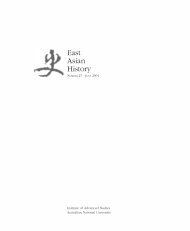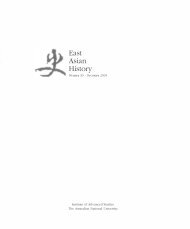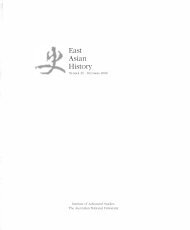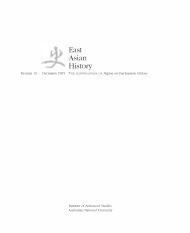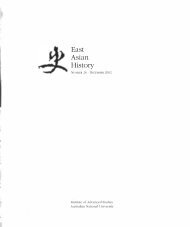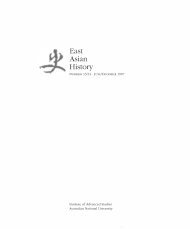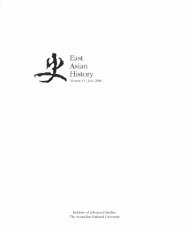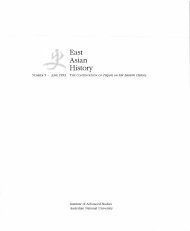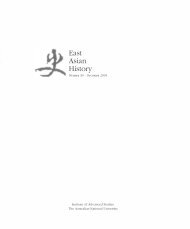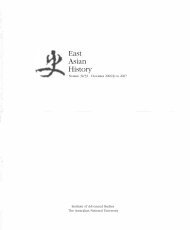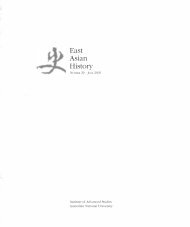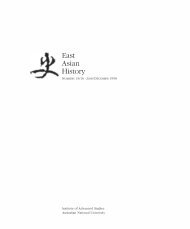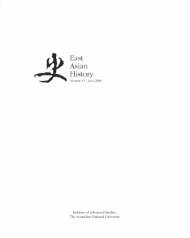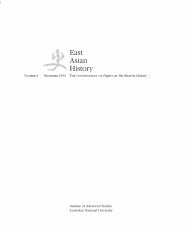Mujaku Dochu (1653-1744) and 17th-Century ... - East Asian History
Mujaku Dochu (1653-1744) and 17th-Century ... - East Asian History
Mujaku Dochu (1653-1744) and 17th-Century ... - East Asian History
Create successful ePaper yourself
Turn your PDF publications into a flip-book with our unique Google optimized e-Paper software.
"<br />
MUJAKU DOCHO<br />
51<br />
Figure 10<br />
<strong>Mujaku</strong> 's introduction to the debate over<br />
the Seng-chao in his Kinben shikai<br />
manuscript<br />
the assertion in Chen-ch'eng's last sentence.139<br />
Thus <strong>Mujaku</strong> concluded that<br />
"the nature abides" <strong>and</strong> "the nature<br />
is empty" are identical, <strong>and</strong> concluded<br />
that Seng-chao's ideas "cannot be<br />
pettily contradicted. I request that the<br />
dispute be put to rest" . 1 40<br />
Next, <strong>Mujaku</strong> engaged with other<br />
supplementary arguments such as<br />
those by Ch'eng-kuan who said Sengchao<br />
was arguing that "if the nature is<br />
not empty, that is not true emptiness,<br />
which is to elucidate the meaning of<br />
the nature is empty in reference to the<br />
vulgar truth as it being unshifting. ,, 141<br />
<strong>Mujaku</strong> then quoted Chu-hung 1 42 <strong>and</strong><br />
concluded that Ch'eng-kuan <strong>and</strong> Chuhung<br />
were using a supplementary<br />
argument to make up for the flaws in<br />
the case that the nature is empty:<br />
<br />
rf. 1<br />
'I<br />
- . <br />
-<br />
'f3<br />
1" !f 1-<br />
t<br />
o <br />
i-t. 1 :#<br />
/l1J(<br />
14. 1"£ W <br />
<br />
'!i 1ft<br />
it .<br />
<br />
As Chen-ch'eng was unwilling to<br />
accept this, he said, "Although the<br />
Basic Meanings of the Propositions (Tsung-pen [i of Seng-chaoD says the<br />
nature is empty <strong>and</strong> yet is not eliminated, still it says that the nature<br />
persists, which is the fundamental <strong>and</strong> derivative in opposition to each<br />
other. Does that not substantially violate the method of logic, his own<br />
words being self-contradictory?" As I see it, Ch'eng-kuan [yen-i] was<br />
saying that "not true emptiness" elucidates that the nature is empty in<br />
reference to the elucidation of the basis of the text, so really the Thesis<br />
on Not True Emptiness (Pu chen lun) also fully clarified "the nature is<br />
empty". But that was in reference to the primal meaning siddhanta (proposition),<br />
<strong>and</strong> is not the same as the usual path ... (which states that) ...<br />
,t<br />
" ,<br />
.-<br />
I.J ;r.".<br />
It<br />
.<br />
tf.-. I $ I<br />
J: t<br />
,<br />
' .J<br />
_ 1<br />
__<br />
i ,--"'<br />
I<br />
1J -IF<br />
) JjJ <br />
-;!c <br />
<br />
<br />
}<br />
JiiJ ,"fl<br />
ij 2J <br />
. .<br />
it . Jlt :!.<br />
.- ' I<br />
I"' <br />
- l ." t ,<br />
11t. If :<br />
:<br />
-M"<br />
t 1l(<br />
/' ,<br />
:t 1: 11;, r<br />
<br />
*.<br />
- ,<br />
<br />
"n<br />
0<br />
-tl<br />
<br />
It i!d<br />
1<br />
il'<br />
1i 4; .. <br />
.t±<br />
,<br />
!:z..<br />
<br />
:.<br />
<br />
- '<br />
-- <br />
,,) ?f<br />
1}t <br />
r.f<br />
<br />
'r::?



